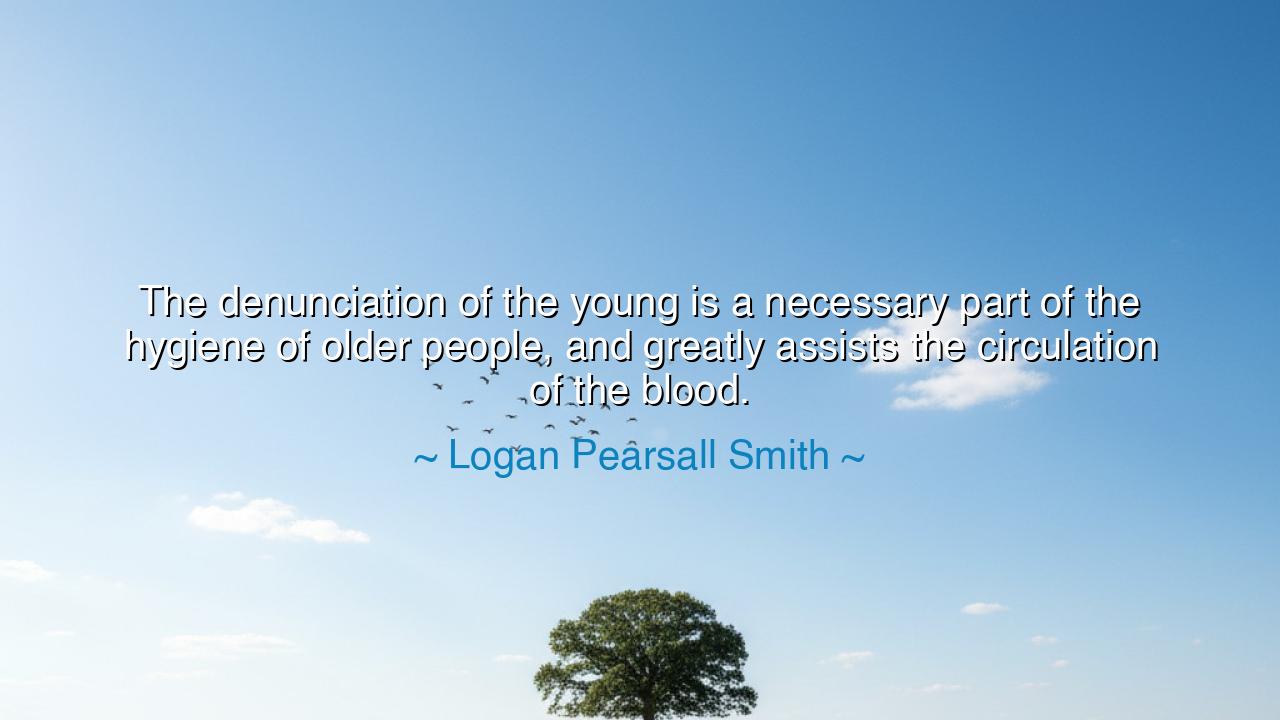
The denunciation of the young is a necessary part of the hygiene
The denunciation of the young is a necessary part of the hygiene of older people, and greatly assists the circulation of the blood.






"The denunciation of the young is a necessary part of the hygiene of older people, and greatly assists the circulation of the blood." These words from Logan Pearsall Smith speak to an interesting, and at times controversial, aspect of human nature. At first glance, the notion that older people must criticize the younger generation as a form of self-care may seem odd, even harsh. Yet within this idea lies a profound commentary on the relationship between age and youth, the dynamics of change, and the instinctual need for the older to reaffirm their position in a world that moves ever forward. Smith’s words, though layered with humor, reveal an uncomfortable truth about how we often deal with the passage of time and the role each generation plays in the shaping of the next.
In every age, there has been a tendency for the older generation to look upon the youth with suspicion or disdain. The young are often seen as reckless, impulsive, and unworthy of the wisdom of their elders. This antagonism, though not always voiced openly, is a common thread woven into the fabric of human history. For the older generation, the act of denouncing or criticizing the young serves as a form of self-preservation, a way of asserting the authority and wisdom that come with age. In criticizing the youth, the elderly create a mental and emotional distance between themselves and the rapidly changing world around them, thereby ensuring that they remain tethered to the traditions and values they hold dear.
Yet, Smith’s quote also suggests something more than mere generational conflict. The act of denunciation may be a catharsis for the older generation, a way to release the pent-up frustrations of a lifetime and perhaps even to find renewal. As strange as it may sound, the criticism of the young can indeed serve a vital function: it can help the older generation confront their own fears and uncertainties, particularly in the face of inevitable change. The act of criticizing the new generation may, in fact, invigorate their spirits, allowing them to reclaim a sense of vitality and relevance. Just as the body requires regular physical exertion to maintain circulation, so too does the mind require emotional exertion—like denouncing the young—to keep its energies flowing freely.
This dynamic is not a new one. Throughout history, we find numerous examples of elders expressing disdain for the younger generation. Consider, for instance, the words of the ancient Greek philosopher Socrates, who famously critiqued the youth of Athens for their perceived lack of respect for tradition and wisdom. Yet, as Socrates himself demonstrated, this tension between the young and the old can be a fertile ground for the growth of new ideas. The elder’s role, therefore, is not merely to criticize but to challenge the youth to rise to the occasion, to prove that they are worthy of the wisdom of their elders and the legacy they inherit.
In the modern era, this tension remains ever-present. We see it in the dismissive attitudes that older generations often have toward technology, pop culture, or social movements that disrupt the status quo. There is a tendency to view youthful rebellion as something dangerous, something that threatens the established order. Yet, like the elderly critic who must vent their frustration to remain mentally and emotionally healthy, the youth have their own role to play in the circulation of progress. Without them, the wheels of society would grind to a halt, weighed down by the heavy burdens of tradition and complacency. Both generations, in their mutual tension, serve as the pulse of society, pushing and pulling, advancing and resisting.
The lesson here, then, is not simply about the denunciation itself but about the balance between the old and the young. For the elderly, self-care involves not just caring for the body but also maintaining an emotional connection to the future—which, inevitably, lies in the hands of the younger generation. Criticism, when applied thoughtfully, can be a catalyst for growth, for both the critic and the criticized. It forces both parties to confront their assumptions, their fears, and their assumptions about the world. Just as the body needs to circulate blood to stay alive, so does society need the tension between generations to thrive and evolve.
For the young, the lesson is to listen to the criticisms of the elderly, not as personal attacks, but as invitations to engage in a deeper dialogue about the future of the world. The challenge is not to simply reject the voices of the old but to find wisdom in their criticisms and to use it as a springboard for change. This exchange, when done with respect, can lead to a more vibrant society, one that honors its past while embracing its future. To resist the criticisms of the older generation is to cut oneself off from an important part of the human experience—the constant dance between the old and the new, between the familiar and the unfamiliar.
Thus, let us not view the denunciation of the young by the elderly as a mere source of conflict but as an essential ritual that helps the heart of society maintain its circulation. Let both the young and the old recognize their roles in this eternal dance, for in their tension, there is growth, there is life. Let us honor the wisdom of the elderly, even as we strive to create a world that reflects the ideals and aspirations of the young. In this way, both generations can contribute to the vitality of society, ensuring that, though the blood may flow with the occasional friction, it continues to circulate—vibrant, ever-changing, and full of life.






AAdministratorAdministrator
Welcome, honored guests. Please leave a comment, we will respond soon